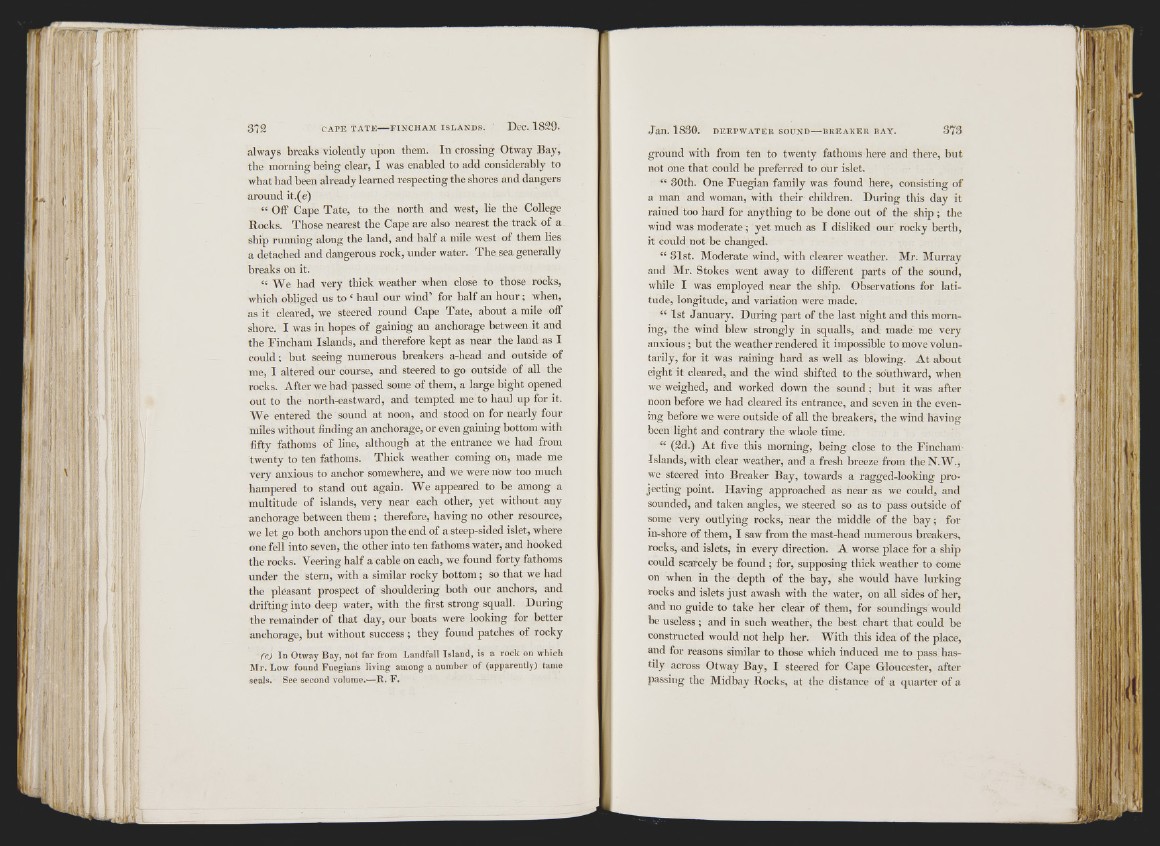
j f j w '
!/'■
r. ;
ìì' ì H' - l
always breaks violently upon them. In crossing Otway Bay,
the morning being deal’, I was enabled to add considerably to
what liad been already learned respecting the shores and dangers
around it.(e)
“ Off“ Cape Tate, to the north and west, lie the College
Rocks. Those nearest the Cape are also nearest the track of a
ship running along the land, and half a mile west of them lies
a detached and dangerous rock, under water. The sea generally
breaks on it.
“ We had very thick weather when close to those rocks,
which obliged us to ‘ haul our wind’ for half an hour; when,
as it cleared, we steered round Cape Tate, about a mile off
shore. I was in hopes of gaining an anchorage between it and
the Fincham Islands, and therefore kept as near the land as I
could; but seeing numerous breakers a-head and outside of
me, I altered our course, and steered to go outside of all the
rocks. After we had passed some of them, a large bight opened
out to the north-eastward, and tempted me to haul up for it.
We entered the sound at noon, and stood on for nearly four
miles without finding an anchorage, or even gaining bottom with
fifty fathoms of line, although at the entrance we had from
twenty to ten fathoms. Thick weather coming on, made me
very anxious to anchor somewhere, and we were now too much
hampered to stand out again. We appeared to be among a
multitude of islands, very near each other, yet without any
anchorage between them ; therefore, having no other resource,
we let go both anchors upon the end of a steep-sided islet, where
one fell into seven, the other into ten fathoms water, and hooked
the rocks. Veering half a cable on each, we found forty fathoms
under the stern, with a similar rocky bottom; so that we had
the pleasant prospect of shouldering both our anchors, and
drifting into deep water, with the first strong squall. During
the remainder of that day, our boats were looking for better
anchorage, hut without success ; they found patches of rocky
Cej In Otway Bay, not far from Landfall Island, is a rock on wliich
M r. Low found Fuegians living among a number of (apparently) tame
seals. See second volume.—R. F.
ground with from ten to twenty fathoms here and there, but
not one that could be preferred to our islet.
“ 30th. One Fuegian family was found here, consisting of
a man and woman, with their children. During this day it
rained too hard for anything to be done out of the ship; the
wind was moderate; yet much as I disliked our rocky berth,
it could not be changed.
“ 31st. Moderate wind, with clearer weather. Mr. Murray
and Mr. Stokes went away to different parts of the sound,
while I was employed near the ship. Observations for latitude,
longitude, and variation were made.
“ 1st January. During part of the last night and this morning,
the wind blew strongly in squalls, and made me very
anxious; but the weather rendered it impossible to move voluntarily,
for it was raining hard as well as blowing. At about
eight it cleared, and the wind shifted to the southward, when
we weighed, and worked down the sound; but it was after
noon before we had cleared its entrance, and seven in the evening
before we were outside of all the breakers, the wind having
been light and contrary the whole time.
“ (2d.) At five this morning, being close to the Fincham
Islands, with clear weather, and a fresh breeze from the N.AV.,
we steered into Breaker Bay, towards a ragged-looking projecting
point. Having approached as near as we could, and
sounded, and taken angles, we steered so as to pass outside of
some very outlying rocks, near the middle of the bay; for
in-shore of them, I saw from the mast-head numerous breakers,
rocks, and islets, in every direction. A worse place for a ship
could scarcely be found ; for, supposing thick weather to come
on when in the depth of the bay, she would have lurking
rocks and islets just awash with the water, on all sides of her,
and no guide to take her clear of them, for soundings would
be useless; and in such weather, the best chart that could be
constructed would not help her. AVith this idea of the place,
and for reasons similar to those which induced me to pass hastily
across Otway Bay, I steered for Cape Gloucester, after
passing the Midbay Rocks, at the distance of a quarter of a
h I
I
, r
1
ll ■I.
I